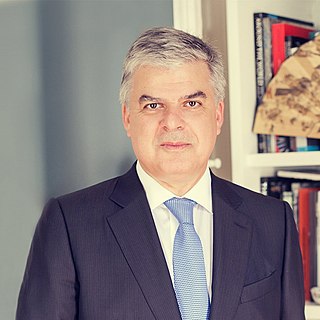
Manuel José de Araújo Porto-Alegre, Baron of Santo Ângelo, was a Brazilian Romantic writer, painter, architect, diplomat and professor, considered to be one of the first Brazilian editorial cartoonists ever. He is the patron of the 32nd chair of the Brazilian Academy of Letters.

Carlos Alberto de Barros Franco, is a Brazilian physician and professor, specializing in Pneumology. He graduated in 1971.
Santiago Americano Freire was a scientist of many interests and fields of works in science and culture.
Júlio Afrânio Peixoto was a Brazilian physician, writer, politician, historian, university president, and pioneering eugenicist. He held many public offices, including Brazilian congressional representative from Bahia in the federal Câmara de Deputados (1924–1930), first the president of the Universidade Federal do Rio de Janeiro, member of the Brazilian Cultural Center in the United States, president of the Academia Brasileira de Letras, and honorary doctorates from Coimbra University and the University of Lisbon, Portugal.

Manuel María Uribe Angel was a Colombian physician, geographer and politician, he has been called the "father of medicine of Antioquia" for his contributions to the advances of the practice of medicine in Colombia and the Antioquia Department. He was also known outside the realm of medicine for his studies and works on the geography and history of Colombia. He also served as President of the then Sovereign State of Antioquia and as Senator of Colombia.

The Buenos Aires National Academy of Medicine is an Argentine non-profit organization and learned society.
Marie Josefina Mathilde Durocher was a Brazilian obstetrician, midwife and physician. She was the first female doctor in Latin America.

The Polytechnic School of Federal University of Rio de Janeiro, also called "Poli", founded in 1792, is the third oldest engineering school in the world and oldest in the Americas, with the Military Institute of Engineering being one of the first institutions of higher education in Brazil. It is considered one of the best institutions of Latin America in engineering education. It is located in the UFRJ Center of Technology (CT), in the Cidade Universitária, Rio de Janeiro.
Orestes Fiandra, was a professor and researcher in medicine and cardiology in Uruguay.

Edgar Roquette-Pinto was a Brazilian writer, ethnologist, anthropologist and physician. He was a member of the Academia Brasileira de Letras and is regarded as the father of radio broadcasting in Brazil.

Rafael Radi is a Uruguayan biochemist and biomedical scientist who has extensively worked to elucidate molecular mechanisms by which free radicals, oxidants and nitric oxide participate in human pathologies. In particular, he has made relevant contributions to unravelling how the signal transducing free radical nitric oxide can evolve into toxic species via the formation of secondary nitric oxide-derived oxidants. His work has characterized reactions of oxidizing species with biological targets, the role of mitochondrial dysfunction is the alterations of cellular redox homeostasis and the impact of these biochemical processes in disease states. He has studied the actions of synthetic compounds in redox-based therapeutics, including cardiovascular and neurodegenerative diseases. This work has also contributed to understanding the redox biology of host cell interactions with intracellular pathogens and the impact in the control of infectious diseases. His seminal paper related to the biochemical actions of peroxynitrite, a potent oxidant and nucleophile formed secondary to the diffusion-controlled reaction of nitric oxide with superoxide radicals together with Joe S. Beckman, Kent Bush and Bruce A. Freeman in 1991 has been selected as a JBC Classics due to its influence in the field.

Pablo Kuri-Morales is a Mexican public health scientist and epidemiologist.
Fernando Rafael Mönckeberg Barros is a Chilean surgeon, doctor of medicine specializing in nutrition, professor, researcher, and economist at the University of Chile. He is the founder of the Institute of Nutrition and Food Technology of the University of Chile (INTA) and president of the Corporation for Child Nutrition (CONIN).
Eliete Bouskela is a Brazilian physician, researcher and professor at the Rio de Janeiro State University. She works on cardiovascular physiology

Fausto J. Pinto is a Portuguese academic. He is Professor of Cardiology at Hospital de Santa Maria. Former dean of the Faculty of Medicine at the University of Lisbon.

Otto Dörr Zegers. Medical Surgeon of the University of Chile (1961), Psychiatrist, (Graduate School of the Faculty of Medicine, University of Chile ; Doctor of Medicine Heidelberg University ; specialist in Psychiatry and Neurology, University of Heidelberg ; Specialist in Psychotherapy, University of Heidelberg Emeritus Professor of Diego Portales University, Master of Chilean Psychiatry and National Prize for Medicine in 2018, the paternity of the disease entity "Bulimia Nervosa". Dörr previously described it as “Secondary hyperphagia and vomiting syndrome in young women" in the Chilean Journal of Neuropsychiatry in 1972, an article that was published in English in the “International Journal of Eating Disorders".

Philippe Froguel is a French physician and scientist who serves as chair in Genomic Medicine in the Department of Metabolism, Digestion and Reproduction at Imperial College London. His research has focused on the genetics of human diseases such as obesity and type 2 diabetes. This includes research identifying the genes glucokinase and HNF1 risk factors for type 2 diabetes. In 2007, he was elected to the Academy of Medical Sciences (UK). In 2017, he was elected corresponding member of the French Académie Nationale de Médecine, and he is also a member of the Mexican National Academy of Medicine.

Benjamim Franklin de Ramiz Galvão (1846–1938) was a Brazilian doctor, scholar, administrator and public intellectual.

Ermelinda Lopes de Vasconcelos was a Brazilian doctor. She was the second female doctor to graduate from university in Brazil and the first in Rio de Janeiro state. As an obstetrician she is said to have been present at over ten thousand births.

The Royal National Academy of Medicine is a Spanish institution dedicated to the study, research and promotion of the medical sciences. It's motto is Ars cum natura ad salutem conspirans, "Art collaborating with nature for health".














